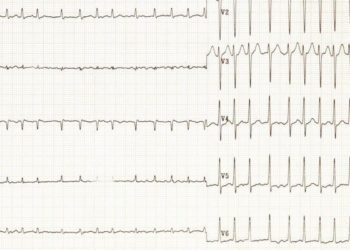Fluid replacement with hydroxyethyl starch linked with higher mortality
Feb 19th – In a study published today, hydroxyethyl starch use in fluid resuscitation associated with an increased risk of mortality.
[tabs tab1=”2MM Rundown” tab2= “2MM Full Report”]
[tab]
Image: PD
1. Hydroxyethyl starch use in fluid resuscitation associated with an overall mortality risk ratio of 1.07.
2. Excluding controversial Boldt et al studies, hydroxyethyl starch is associated with an increased mortality risk ratio of 1.09.
Published today, this systematic review and meta-analysis indicates that hydroxyethyl starch, in comparison to 0.9% sodium chloride, Ringer’s lactate, Ringer’s acetate, gelatin, albumin, and plasma, significantly increased rates of mortality, acute renal failure, and renal replacement therapy. These results prove to be particularly important given the controversy concerning the use of hydroxyethyl starch over other volume expanders for critically ill patients. Advantages for the use of hydroxyethyl starch were originally shown in a series of studies by Joachim Boldt, many of which have since been retracted due to possible ethical and scientific misconduct. Excluding studies by Dr. Boldt, there was a 1.09 relative risk for mortality with the use of hydroxyethyl starch relative to other fluid types. Hence this study reinforces a growing notion that hydroxyethyl starch should not be used for acute fluid resuscitation in critically ill patients.
A few limitations should be considered for this study. First, up to 95% of the trials included in the meta-analysis were determined to be of either unclear or high risk of bias. Secondly, most subgroup studies in the analysis were of a small sample size, predisposing the results to type II error. Nonetheless, this study provides a solid foundation for the decreased use of hydroxyethyl starch as a fluid resuscitation medium, and it serves as a foundation for further large scale studies into the appropriate selection of intravenous fluids for critically ill patients.
Click to read the study in JAMA
[/tab]
[tab]
Image: PD
1. Hydroxyethyl starch use in fluid resuscitation associated with an overall mortality risk ratio of 1.07.
2. Excluding controversial Boldt et al studies, hydroxyethyl starch is associated with an increased mortality risk ratio of 1.09.
This [systematic review and meta-analysis]: The study was a meta-analysis of 38 randomized controlled trials involving 10,868 patients comparing hydroxyethyl starch to other fluid replacement therapies. Overall mortality risk ratio was calculated both with (RR, 1.07; 95%CI, 1.00 to 1.14) and without (RR, 1.09; 95% CI. 1.02 to 1.17) 7 Boldt et. al studies which have not been retracted. Mortality risk ratio of the 7 studies alone was 0.91 (95%CI, .74 to 1.12), showing no association between hydroxyethyl starch and mortality. Excluding the Boldt et. al trials, it was shown hydroxyethyl starch is associated with a significant risk of mortality.
Furthermore, hydroxyethyl starch significantly increased the risk of renal replacement therapy (RR, 1.32; 95%CI, 1.15 to 1.50) and acute renal failure (RR, 1.27; 95%CI, 1.09 to 1.47) when compared to other intravenous fluids.
In sum: This systematic review and meta-analysis indicates that hydroxyethyl starch, in comparison to 0.9% sodium chloride, Ringer’s lactate, Ringer’s acetate, gelatin, albumin, and plasma, significantly increased rates of mortality, acute renal failure, and renal replacement therapy. These results prove to be particularly important given the controversy concerning the use of hydroxyethyl starch over other volume expanders for critically ill patients. Advantages for the use of hydroxyethyl starch were originally shown in a series of studies by Joachim Boldt, many of which have since been retracted due to possible ethical and scientific misconduct. Excluding studies by Dr. Boldt, there was a 1.09 relative risk for mortality with the use of hydroxyethyl starch relative to other fluid types. Hence this study reinforces a growing notion that hydroxyethyl starch should not be used for acute fluid resuscitation in critically ill patients.
A few limitations should be considered for this study. First, upto 95% of the trials included in the meta-analysis were determined to be of either unclear or high risk of bias. Secondly, most subgroup studies in the analysis were of a small sample size, predisposing the results to type II error. Nonetheless, this study provides a solid foundation for the decreased use of hydroxyethyl starch as a fluid resuscitation medium, and it serves as a foundation for further large scale studies into the appropriate selection of intravenous fluids for critically ill patients.
Click to read the study in JAMA
By John Prendergass and Rif Rahman
More from this author: Protected sleep periods improve intern alertness and sleep duration, ADHD medication decreases rates of criminality in ADHD patients, Low dose aspirin shows net clinical benefit in patients with first unprovoked venous thromboembolism
© 2013 2minutemedicine.com. All rights reserved. No works may be reproduced without written consent from 2minutemedicine.com. Disclaimer: We present factual information directly from peer reviewed medical journals. No post should be construed as medical advice and is not intended as such by the authors or by 2minutemedicine.com. PLEASE SEE A HEALTHCARE PROVIDER IN YOUR AREA IF YOU SEEK MEDICAL ADVICE OF ANY SORT. Content is produced in accordance with fair use copyrights solely and strictly for the purpose of teaching, news and criticism. No benefit, monetary or otherwise, is realized by any participants or the owner of this domain.
[/tab]
[/tabs]




